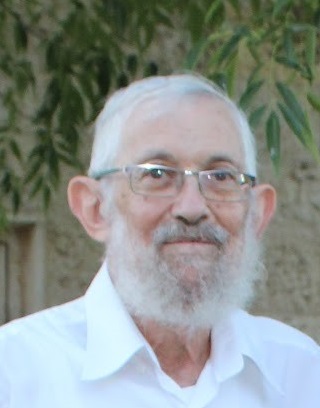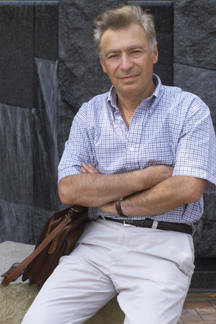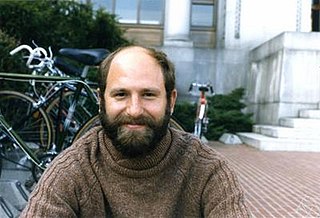Manfred Leopold Einsiedler (6 March 1973) is an Austrian mathematician.
Contents

Manfred Leopold Einsiedler (6 March 1973) is an Austrian mathematician.

Einsiedler studied mathematics at the University of Vienna, where he received his undergraduate degree in 1996 and his PhD in 1999 under Klaus Schmidt with thesis Problems in higher dimensional dynamics. [1] He was a postdoc in the academic year 2000–2001 at the University of East Anglia in Norwich and in the academic year 2001–2002 at Penn State University. In 2001 he earned his habilitation at the University of Vienna and then became there a professor extraordinarius (on leave). In the academic year 2004–2005 he was a visiting professor at Princeton University (as a Clay Research Scholar). At Ohio State University he became in 2006 an associate Professor and in 2008 a full professor. Since 2009 he has been a professor ordinarius at ETH Zürich. [2]
In 2004 he won the Research Prize of the Austrian Mathematical Society. In 2008 he was an invited speaker (Effective equidistribution and spectral gap) at the European Mathematical Congress in Amsterdam. In 2010 he was an invited speaker (Application of measure rigidity of diagonal actions) at the International Congress of Mathematicians in Hyderabad. In 2019 Einsiedler was also an invited speaker at the conference Dynamics, Equations and Applications in Kraków. [3]
Einsiedler works on ergodic theory (especially, dynamical and equidistribution problems on homogeneous spaces) and its applications to number theory. He has collaborated with Grigory Margulis and Akshay Venkatesh. With Elon Lindenstrauss and Anatole Katok, Einsiedler proved that a conjecture of John Edensor Littlewood on diophantine approximation is "almost always" true. [4] [5] ( "Almost always" means in this context that the set of pairs of real numbers for which the conjecture fails has (in particular) Hausdorff dimension zero.)
Ergodic theory is a branch of mathematics that studies statistical properties of deterministic dynamical systems; it is the study of ergodicity. In this context, statistical properties means properties which are expressed through the behavior of time averages of various functions along trajectories of dynamical systems. The notion of deterministic dynamical systems assumes that the equations determining the dynamics do not contain any random perturbations, noise, etc. Thus, the statistics with which we are concerned are properties of the dynamics.
In mathematics, the Littlewood conjecture is an open problem in Diophantine approximation, proposed by John Edensor Littlewood around 1930. It states that for any two real numbers α and β,

Jean, Baron Bourgain was a Belgian mathematician. He was awarded the Fields Medal in 1994 in recognition of his work on several core topics of mathematical analysis such as the geometry of Banach spaces, harmonic analysis, ergodic theory and nonlinear partial differential equations from mathematical physics.

Grigory Aleksandrovich Margulis is a Russian-American mathematician known for his work on lattices in Lie groups, and the introduction of methods from ergodic theory into diophantine approximation. He was awarded a Fields Medal in 1978, a Wolf Prize in Mathematics in 2005, and an Abel Prize in 2020, becoming the fifth mathematician to receive the three prizes. In 1991, he joined the faculty of Yale University, where he is currently the Erastus L. De Forest Professor of Mathematics.

Yuri Vladimirovich Linnik was a Soviet mathematician active in number theory, probability theory and mathematical statistics.
In Diophantine approximation, the Oppenheim conjecture concerns representations of numbers by real quadratic forms in several variables. It was formulated in 1929 by Alexander Oppenheim and later the conjectured property was further strengthened by Harold Davenport and Oppenheim. Initial research on this problem took the number n of variables to be large, and applied a version of the Hardy-Littlewood circle method. The definitive work of Margulis, settling the conjecture in the affirmative, used methods arising from ergodic theory and the study of discrete subgroups of semisimple Lie groups.

Akshay Venkatesh is an Australian mathematician and a professor at the School of Mathematics at the Institute for Advanced Study. His research interests are in the fields of counting, equidistribution problems in automorphic forms and number theory, in particular representation theory, locally symmetric spaces, ergodic theory, and algebraic topology.

Kannan Soundararajan is an India-born American mathematician and a professor of mathematics at Stanford University. Before moving to Stanford in 2006, he was a faculty member at University of Michigan where he pursued his undergraduate studies. His main research interest is in analytic number theory, particularly in the subfields of automorphic L-functions, and multiplicative number theory.
In mathematics, Ratner's theorems are a group of major theorems in ergodic theory concerning unipotent flows on homogeneous spaces proved by Marina Ratner around 1990. The theorems grew out of Ratner's earlier work on horocycle flows. The study of the dynamics of unipotent flows played a decisive role in the proof of the Oppenheim conjecture by Grigory Margulis. Ratner's theorems have guided key advances in the understanding of the dynamics of unipotent flows. Their later generalizations provide ways to both sharpen the results and extend the theory to the setting of arbitrary semisimple algebraic groups over a local field.
Arithmetic dynamics is a field that amalgamates two areas of mathematics, dynamical systems and number theory. Classically, discrete dynamics refers to the study of the iteration of self-maps of the complex plane or real line. Arithmetic dynamics is the study of the number-theoretic properties of integer, rational, p-adic, and/or algebraic points under repeated application of a polynomial or rational function. A fundamental goal is to describe arithmetic properties in terms of underlying geometric structures.

Elon Lindenstrauss is an Israeli mathematician, and a winner of the 2010 Fields Medal.

Benjamin Weiss is an American-Israeli mathematician known for his contributions to ergodic theory, topological dynamics, probability theory, game theory, and descriptive set theory.

Anatoly Borisovich Katok was an American mathematician with Russian-Jewish origins. Katok was the director of the Center for Dynamics and Geometry at the Pennsylvania State University. His field of research was the theory of dynamical systems.

Philippe Gabriel Michel is a French mathematician who holds the chair in analytic number theory at the École Polytechnique Fédérale de Lausanne in Switzerland.

Yakov Borisovich Pesin was born in Moscow, Russia on December 12, 1946. Pesin is currently a Distinguished Professor in the Department of Mathematics and the Director of the Anatole Katok Center for Dynamical Systems and Geometry at the Pennsylvania State University (PSU). His primary areas of research are the theory of dynamical systems with an emphasis on smooth ergodic theory, dimension theory in dynamical systems, and Riemannian geometry, as well as mathematical and statistical physics.

Steven Morris Zelditch was an American mathematician, specializing in global analysis, complex geometry, and mathematical physics.

Thomas Ward is a British mathematician who works in ergodic theory and dynamical systems and its relations to number theory.

Federico Rodríguez Hertz is a mathematician working in the United States of Argentinian origin. He is the Anatole Katok Chair professor of mathematics at Penn State University. Rodriguez Hertz studies dynamical systems and ergodic theory, which can be used to described chaos's behaviors over the large time scale and also has many applications in statistical mechanics, number theory, and geometry.
Dietmar Arno Salamon is a German mathematician.
Shahar Mozes is an Israeli mathematician.